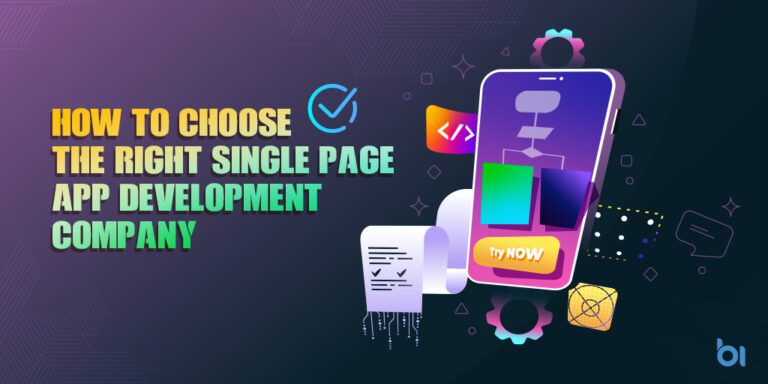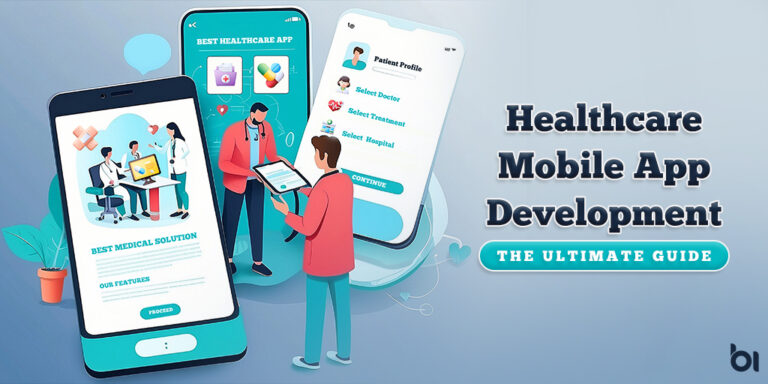As a business looking to build a high-performing single page application, finding the right development partner is crucial. With so many options to choose from, determining the best single page app development company for your needs can feel overwhelming. You want a team with expertise, experience, and a proven track record of success. More than that, you need a partner committed to understanding your business requirements, goals and vision to build a solution that will truly transform how you connect with your customers.
This article provides key considerations to help you evaluate single page app development companies and choose a partner poised to deliver an impactful custom solution for your business. By asking the right questions and looking for the characteristics that really matter, you can find a development team that moves beyond just building an app to becoming a strategic partner in your digital transformation. The ideal partner is out there—you simply need to know what to look for. With the guidelines provided here, you’ll be well on your way to finding a single page app development company that can build the dynamic web experience your business demands.
What Is a Single Page Application?
A single page application (SPA) is a web application that loads a single HTML page and dynamically updates that page as the user interacts with the app. Instead of the traditional process of loading entire new pages as users click around, SPAs use JavaScript to make calls to the server and update the current page with new data.
For the user, this creates a smoother experience that feels more like a native mobile app. For developers, it means building a web interface using frontend JavaScript frameworks like React or Vue.js. Some key benefits of SPAs include:
- Improved user experience. SPAs feel more responsive and app-like. No page reloads interrupt the user flow.
- Increased interactivity. SPAs can more easily handle interactive UI elements like drag and drop without reloading the page.
- Faster page loads. Only data, rather than the entire HTML page, needs to be fetched from the server on navigation.
- Easier maintenance. logic is contained in one page rather than spread across many separate pages.
However, SPAs also introduce some challenges:
- SEO can be more difficult since there is only one page. Rendering web crawlers may struggle with the JavaScript.
- More initial load time. The initial page includes all necessary JavaScript and assets, so it can be quite large.
- Routing is handled client-side. The backend API needs to simply serve data rather than render pages.
- Managing browser history can be complex. SPAs need to manipulate the browser history API to enable proper back button functionality.
When choosing an SPA development company, look for experience building SPAs with robust frameworks, expertise in SEO for SPAs, and high-quality UI/UX design skills for an optimal user experience. With the right developer, SPAs can be a game changer.
Benefits of Single Page Applications
Single page applications (SPAs) offer several benefits over traditional multi-page websites.
Improved User Experience
SPAs provide a seamless user experience. All the necessary HTML, CSS, and JavaScript are loaded with a single page load, then the content is dynamically updated as the user interacts with the app. This results in fast transitions and no page reloads. The app feels very responsive and web-like.
Increased Interactivity
Since the page is not reloaded, it is possible to create highly interactive UIs. Components can be updated independently without disturbing the rest of the page. This enables rich features like drag and drop, animations, and live data dashboards.
Simpler Development
SPAs simplify web development in many ways. There is no need to build separate pages or worry about linking between them. It is also easier to maintain state since data persists between page transitions. This results in less code to write and maintain.
Search Engine Optimization
While SPAs were initially problematic for search engines to index, modern frameworks have solved this issue. SPAs that are built properly can rank very well in search results. Features like server-side rendering, meta tags, and semantic HTML all help search engines understand and rank SPAs.
To summarize, single page applications provide benefits for both users and developers. With a seamless user experience, increased interactivity, simpler development, and solid search engine optimization, SPAs are an excellent choice for modern web applications.
When Is a Single Page App the Right Choice?
When determining if a single page web application is the right choice for your needs, there are several factors to consider:
Complexity of the App
SPAs are ideal for relatively complex web applications with a lot of user interaction and dynamic content updates. If your app will require frequent partial page updates and seamless transitions between views without page reloads, a single page app is a great option. The SPA framework handles rendering UI components and routing client-side, providing a smooth user experience.
Target Audience
The technical savviness of your target audience is important to consider. SPAs provide a highly interactive experience that may be unfamiliar to some users. If your app is targeting less tech-savvy users or the general public, a traditional multi-page website may be more appropriate. However, younger demographics and business users are typically comfortable with the SPA experience.
Development Resources
Developing a robust SPA requires skilled developers and more time/resources compared to a standard website. SPAs are built on JavaScript frameworks like React, Angular, and Vue.js. If you lack in-house developers with expertise in these technologies, you’ll need to hire a web development company with SPA experience. SPAs also require ongoing maintenance and updates to patch vulnerabilities, upgrade frameworks, and scale the app.
SEO Considerations
Search engine optimization can be more challenging for SPAs compared to regular websites. SPAs render content dynamically after page load, so search engine crawlers may have trouble indexing the complete content and following links. However, many of the latest frameworks and web components are “SEO-friendly” and there are workarounds like prerendering content on the server. SPAs can still rank well with the proper optimization.
In summary, for a highly interactive web app targeting tech-savvy users, with resources for ongoing development and optimization, a single page application is an excellent choice. But for a basic site, traditional multi-page website may suit your needs better. The development company you choose should have expertise building and optimizing SPAs to help determine if it’s the right solution for your project.
Key Technologies Used for SPAs
Single page web applications (SPAs) provide a seamless user experience by loading only once, then dynamically updating the page content via JavaScript and asynchronous interaction with a web server. To build SPAs, developers commonly use a combination of technologies including:
- JavaScript frameworks: Frameworks like React, Vue.js and Angular handle rendering UI components, state management, and reactivity. They facilitate building interactive UIs without page reloads.
- RESTful APIs: SPAs interact with backend systems through API calls. The REST architecture uses HTTP requests to GET, POST, PUT and DELETE data. APIs handle data persistence and business logic on the server-side.
- Routing: Client-side routing allows SPAs to have multiple views without reloading the page. As users navigate, the router renders the requested component. Libraries like React Router and Vue Router are popular choices.
- State management: Frameworks have built-in state management, but for larger SPAs, dedicated state management libraries are useful. Redux is a popular choice, handling updating application state and re-rendering components.
- Build tools: Tools like webpack bundle JavaScript modules, transpile modern JavaScript to older standards, and optimize assets. They facilitate organizing and building SPAs.
- Testing: SPAs require extensive unit testing, integration testing, and end-to-end testing. Libraries like Jest, React Testing Library, and Cypress enable testing React applications at multiple levels.
- Styling: CSS frameworks like Bootstrap, Material UI, and Semantic UI provide pre-built components to style SPAs. CSS-in-JS options like Styled Components also facilitate styling components in JavaScript.
By leveraging these technologies, development teams can build fast, interactive user experiences with single page web applications. With a strong foundation in these SPAs and web development skills, companies have many options for capable development partners.
Questions to Ask When Choosing a Single Page App Development Company
When choosing a single page app development company, there are several important questions you should ask to determine if they are the right fit for your project.
What is your experience developing single page apps?
Look for a company with extensive experience building single page web apps, ideally using the same framework you want to use. Ask about their familiarity with frameworks like React, Vue.js, and Angular. See if they have case studies or live examples of SPAs they have built. Experience matters when it comes to delivering a high-quality product.
What is your development process?
A reputable company will have a proven, structured development process for building SPAs. Ask about the specific steps in their process, such as planning, prototyping, design, development, testing, and deployment. They should value requirements analysis, use version control systems, perform frequent testing, and have dedicated QA engineers. Their process should instill confidence they can deliver what you need.
How will you ensure high performance?
SPAs rely heavily on front-end technologies, so performance is critical. Discuss techniques the company uses to optimize performance, e.g. lazy loading, code splitting, caching, CDNs, server-side rendering. They should monitor metrics like page load times, frames per second, and time to interactive. High performance will provide a good user experience and impact SEO.
How will you ensure security?
Security risks are higher with SPAs, so security practices are important. Inquire about how the company handles authentication, authorization, input validation, and encryption. They should keep frameworks and libraries up to date, follow industry standards, and perform regular security audits. Ask if they’ve had any major security incidents. Their answers can reveal how seriously they take security.
What will the project timeline and budget be?
Get an estimate of the total hours and costs for your project. Discuss timelines for the work to be completed. They should provide a detailed plan that breaks down the timeline into specific phases and tasks. Be wary of estimates that seem too low, as they often lead to budget overruns and missed deadlines. Look for a balanced proposal that ensures high quality work within your budget.
Choosing the right SPA development partner is key to the success of your digital product. Asking the right questions will help determine if a company has the experience, skills, and expertise to build the high-performance, secure app you need.
Binary Informatics: Single Page App Development Company
When choosing a single page app development company, there are several factors to consider. Binary Informatics is a reputable company known for building intuitive, interactive single page web applications.
Binary Informatics has over a decade of experience designing and developing single page apps using JavaScript frameworks like React, Vue.js and Angular. Their team of full stack web developers and UX designers work together to build responsive front-end experiences that provide a native mobile app feel. Some of their portfolio of work includes web apps for various industries like healthcare, finance, education, ecommerce and more.
To develop an effective single page app, Binary Informatics follows an agile development methodology with these key steps:
- Requirements analysis: They work closely with clients to determine key features, user stories, sitemaps, and wireframes to outline the scope of the project. This helps to identify priorities and ensure alignment before development begins.
- UI/UX design: Their design team focuses on crafting a seamless user experience through interactive prototypes, visual designs and user flow diagrams. They aim for simplicity and intuitiveness in all their work.
- Front-end development: Using JavaScript frameworks like React or Vue.js, they build the front-end architecture, components, state management, routing and APIs to power the web app.
- Back-end integration: They develop custom APIs and integrate with third-party APIs to connect the front-end to back-end databases and services. Security and scalability are prioritized.
- Testing and deployment: Rigorous cross-browser testing and debugging are performed before launching the web app. They help with hosting setup and deployment to ensure a smooth go-live.
- Maintenance and support: Binary Informatics provides ongoing maintenance, updates and support for all their single page app projects. They continue optimizing performance, security and features over the lifetime of the web app.
With a proven track record of success, skilled team of web developers and commitment to quality, Binary Informatics is an ideal partner for companies looking to build a single page web application. By following their tried-and-true process, they are able to deliver solutions that exceed expectations and transform digital experiences.
Estimating Time and Costs of a Single Page App development Project by Binary Informatics
When choosing a single page app development company like Binary Informatics, estimating the time and costs involved in a project is crucial. Some key factors to consider include:
Scope of Work
The scope of work for your single page app will significantly impact the time and budget required. A basic app with a few views, forms, and API calls will take less time than an enterprise-level app with advanced functionality. Discuss the full scope of your needs with Binary Informatics to get an accurate estimate.
Experience and Expertise
An experienced single page app development team with expertise in your industry will likely complete the work faster than a less experienced team. Binary Informatics has over 10 years of experience building single page apps for companies across various industries. Their expertise enables them to avoid common pitfalls and build solutions efficiently.
Technologies and Frameworks Used
The technologies and frameworks chosen for your single page app also affect time and cost. Binary Informatics leverages robust, modern technologies like React, Vue.js, and Angular to build scalable single page apps. These technologies have a steeper learning curve but enable faster development once mastered. Binary Informatics stays up-to-date with the latest frameworks to provide the best solutions for clients.
Complexity of Features
More complex features like real-time updates, geo-location functionality, and advanced data visualizations add to the time and cost of single page app development. Binary Informatics has experience building apps with a range of complex features. They can determine how long each feature will take to implement and build that into your estimate and timeline.
Testing and Quality Assurance
Thorough testing and quality assurance is essential to the success of any software project and will impact budgets and timelines. Binary Informatics dedicates over 30% of project hours to testing single page apps to ensure high quality, bug-free solutions for clients.
Discussing these key factors in detail with Binary Informatics will help determine an accurate estimate of time and costs for your single page app development project. Their expertise and experience enable them to provide realistic estimates to set proper expectations upfront.
Conclusion
As you can see, selecting the right single page app development company requires diligent research and evaluation. Don’t just go with the first option you find or the cheapest bidder. Take the time to thoroughly vet candidates, check their experience and expertise, review examples of their work, and get references from past clients. The company you choose will have a huge impact on the success of your app, so make this decision carefully. A reputable firm with a proven track record of building innovative, user-friendly web apps that achieve results will be well worth the investment. With the right partner, you’ll be able to bring your vision to life and reach more customers than ever before. The future of your business could depend on the single page app development company you hire today.
FAQ’s
When selecting a single page app development company to build your web application, you likely have many questions. Here are some of the most frequently asked questions and what you should consider:
How much does single page app development cost?
The cost to develop a single page app can range from $5,000 to $500,000 or more, depending on the complexity. Factors that affect the cost include:
-Scope and features: More advanced features like interactive data visualizations, real-time updates, and third-party integrations will increase the cost.
-Custom designs: If you need a custom user interface (UI) and user experience (UX) design, it will cost more than using a standard template.
-Development team: Hiring a team with more experience developing single page apps in JavaScript frameworks like React, Angular, and Vue.js will be on the higher end of the range. Teams overseas typically charge less.
-Hosting and maintenance: Ongoing hosting, support, and updates to the app will also need to be budgeted. Most single page app development companies will provide maintenance packages for a monthly fee.
How long does it take to build a single page app?
The timeline to develop a single page app can take 3-6 months for a basic app or 6-18 months for a complex app. Several factors determine the timeline:
-Scope of features: An app with basic features like forms, lists, and charts will take less time than one with advanced functionality.
-Custom designs: Creating custom UI/UX designs and prototypes adds additional time to the process. Using stock templates can speed up development.
-Integrations: If third-party integrations are required to pull in data or functionality, it will lengthen the timeline.
-Revisions: The number of revisions and changes requested by the client or stakeholders also impacts the total development time.
-Team size: Having a larger team of developers and designers working on the project can reduce the timeline.
How do I choose a single page app development company?
When evaluating single page app development companies, consider these factors:
-Experience: Look for a company with proven experience building single page apps, preferably in your industry. Check their portfolio of past work.
-Skills: The team should have expertise in JavaScript frameworks like React, Angular, and Vue.js, as well as skills in UX/UI design, database integration, and version control systems.
-Communication: Effective communication is key to a successful partnership. Choose a company that is responsive, provides status updates, answers your questions thoroughly, and gives realistic timelines.
-Reviews: Read reviews from the company’s previous clients to determine their strengths, weaknesses, and overall customer satisfaction. Look for a track record of delivering high-quality work on time




